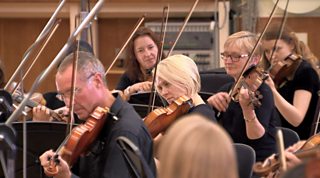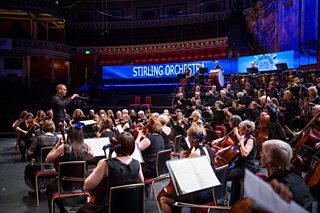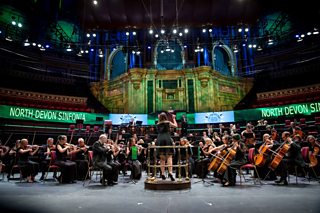All Together Now: The Great Orchestra Challenge - celebrating amateur music making
Jon Jacob
Editor, About the 主播大秀 Blog
Tagged with:

The Slaithwaite Philharmonic Orchestra
There are moments when I watch or listen to programmes on television or radio and have a sixth sense that this programme has been made especially for me – a treat or a personal indulgence for which I can legitimately wrest control of the TV remote from my partner and make some demands. – a four episode challenge to find the most inspiring UK amateur orchestra – is a good example.
Gemma McAusland from Stirling Orchestra, one of the groups who participated in the Final of the competition staged at the Royal Albert Hall, helped illustrate the common misunderstanding about the word ‘amateur’ during an interview a few days before.
"It’s a strange word to describe things. My perception of it is that there is this stigma that ‘you’re not quite good enough to be professional’. For me we need to define the word. For example, we have some amazingly talented musicians in our orchestra, but the expertise they’re paid for is in a different field."

Stirling Orchestra at the Royal Albert Hall
I’ve written before on this blog about my love of classical music – a lifelong friend that has always delivered, never let me down, and always surprised and delighted. A lot of that appreciation comes from my experiences as a teenager playing in training orchestras and amateur groups. For some of those who learn how to play an instrument, playing in an orchestra is the next step. But the amateur scene also brings a wide range of different people together.
"Our cello section in the Stirling Orchestra has a real mix of ages," continued Gemma during the interview. "We are a group of people who just have the same sense of humour. We love music of course, but it’s more about the fun for us. We play because it is our hobby: it’s that fine balance between not wanting it to be professional or perfection. If it’s professional it’s no longer is a hobby. Amateur means you’re doing something because you love it; it doesn’t mean you’re not good enough’."
Broadcasting has a habit of insisting on the very best exponents in a particular field. It showcases professionals - audiences have come to expect that – and puts them on the screen or behind the microphone. In other cases it creates entertainment with the tantalising prize of being a professional at the end of the process.
All Together Now differed by celebrating the amateur and in the process encouraging others to do the same. That’s why seeing the North Devon Sinfonia and Stirling Orchestra join forces for a special performance of Nimrod from Elgar’s Enigma Variations when the finalists convened at the Royal Albert Hall was such a special affair.
Stirling Orchestra and North Devon Sinfonia join together to play Nimrod from Elgar's Variations
There was an egalitarian quality to the concert experience which made for an emotional interpretation. The music – seen by many as the epitome of British identity in musical form – is made all the more potent we identify with the performers. To see people like us perform in an iconic concert space like the Royal Albert Hall brought a new energy to the piece.
Something similar occurred in episode one of the series when all of the competing orchestras got the chance to perform their symphonic extracts in 主播大秀 Maida Vale studios – the iconic home of the 主播大秀 Symphony.
We weren’t listening out for the ‘best’ performance; we were experiencing a different kind of performance, one hyped-up by playing in one of many aspirational spaces for an orchestral musician. The energy from the was electric. The was similarly gripping. As a demonstration of the inclusivity of participatory music-making, the rendition of the March to the Scaffold highlighted the fun in playing classical music which is often overlooked.
These, like all of the repertoire each orchestra had to learn during the series, challenged the players. Winners North Devon Sinfonia performed an excerpt from Beethoven’s fifth symphony.

Winning amateur orchestra North Devon Sinfonia
Speaking before the final, conductor Emma Kent explained the impact having to learn what was unfamiliar repertoire for the orchestra:
"When you’re dealing with Beethoven or Mozart – you have to be clear and precise. Broad brush strokes – our specialty – is not what works. Broad brush strokes helps amateur orchestras engage emotionally with the music – it’s easier to take people on that emotional journey.
But where the music of Mozart or Beethoven is concerned for example, precision and neatness is incredibly important. That can present a real challenge for amateur musicians. So to be presented with Beethoven 5 like we were in the first episode was a really good way of forcing us to look at the detail.”
That challenge is evident in each performance too. Above all else, I appreciated the fragility evident in the playing. With fragility comes an authenticity which helps give familiar music a human angle that we miss with the standard of professional performances we’ve come to expect. It is through amateur music making that players and listeners alike come to understand a work a little better. And there are – as far as I recall – very few occasions in broadcasting where that opportunity arises.
Jon Jacob is Editor of the About the 主播大秀 website and blog.
- Watch all four episodes of 'All Together Now: The Great Orchestra Challenge' on .
- Read Jon Jacob's interview with the 主播大秀 Symphony Orchestra's Chief Conductor ''.
